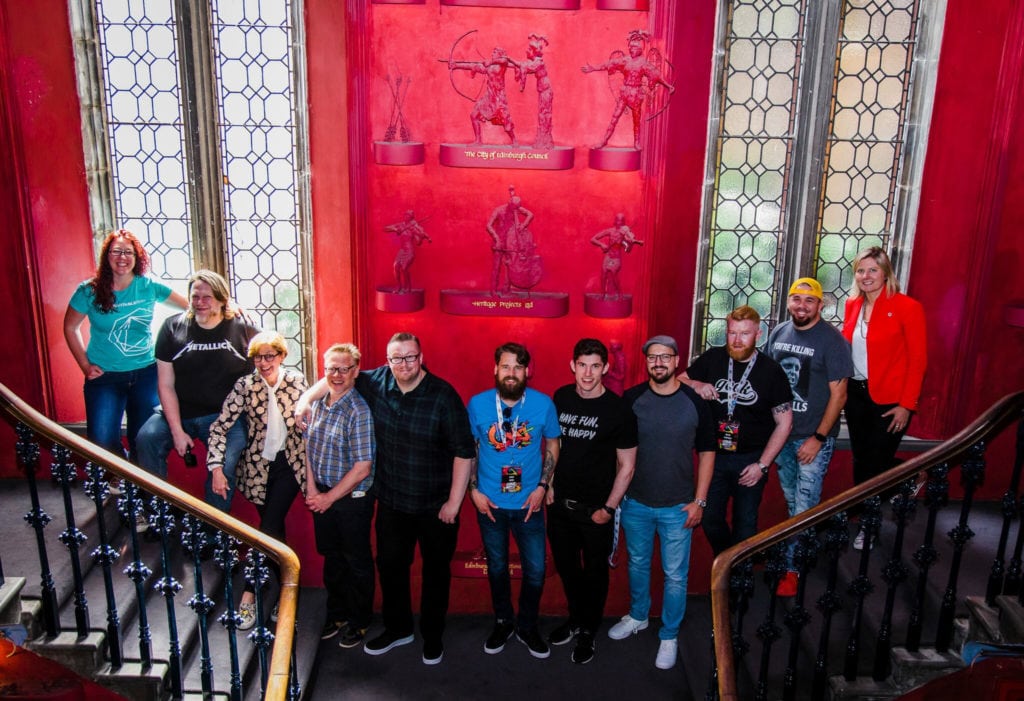 You’ve heard me going on about content marketing for years.
You’ve heard me going on about content marketing for years.
“I know, I know…Karen says to write content regularly. She says that video is really important and that it doesn’t have to be perfect, but it does need to be done. I’ll get round to it eventually.”
Last week I attended a conference that reminded me of how important it is for you as accountants to surround yourself with those who are preaching the right messages to you.
The book “They Ask You Answer” has been an incredible catalyst for accountants to take marketing action in their firm….and the CMA Live event is like that, but live and in person.
Katharine from Stubbs Parkin, who is in our Marketing Community facebook group, won the free ticket to CMA Live and she’s ready to buy a ticket for 2019 as a result!
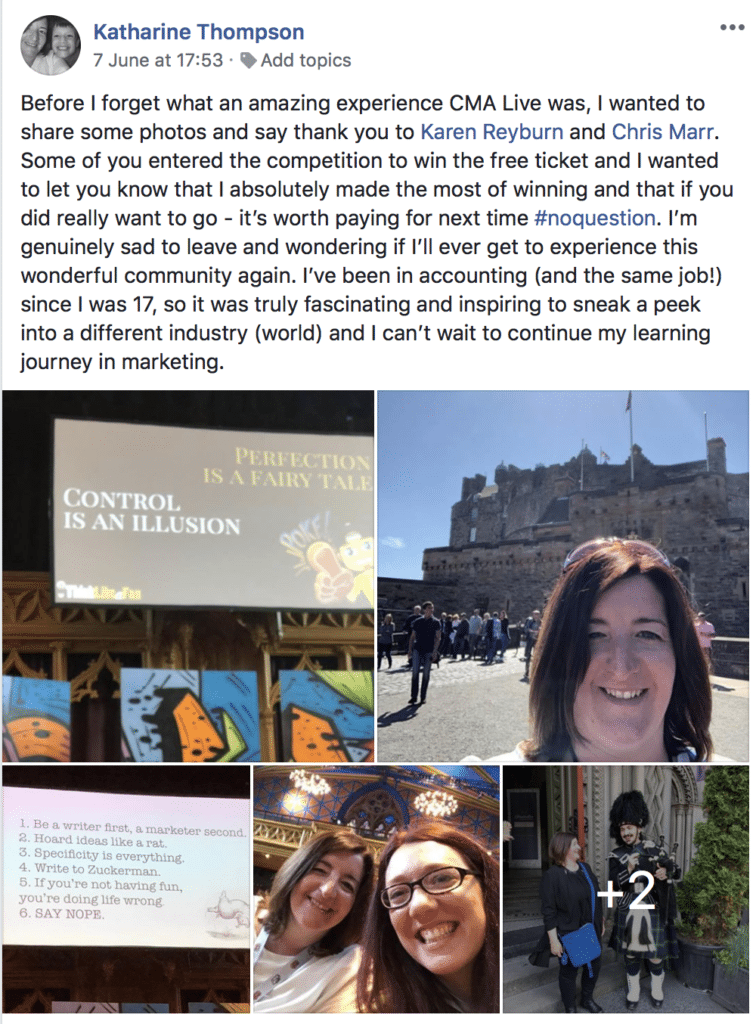
Join the PF marketing community on Facebook.
Here are 9 messages I took from CMA Live that I want to share with you. Many of them are not new concepts – which is exactly the point. I’m not the only one sharing the values of content marketing for your firm….and the time to start is yesterday, not now. (But if that time machine isn’t working yet, then now will do.)
These speakers were absolutely world-class. I highly recommend following them on whatever your preferred social platform is (or all of the socials). I’ve included links to their Twitter for simplicity.
1. Have an opinion.
“No one remembers grey”, said Mark Asquith. He pointed out that when you share something…
30% of those who see it will vaguely like it
30% will actively dislike it
30% don’t really care
and only 10% will absolutely love it and connect with you
You’re looking for the 10%.
One of the ways to have an opinion is to ask yourself about the things in your industry that…
- Annoy you
- You love
- No one talks about
- You want to fix
Those will be the drastic things. The ones people will have an opinion on. I see it all the time on LinkedIn – there was an incredibly long and fierce conversation recently about Xero apps asking for credit card details on a trial. Some said “absolutely not, it drives me insane”, and others said “actually it makes sense to me for this reason”. But they had opinions.
Chris Brogan agreed: he said, “Having an opinion is your sorting hat.” (You all know that one stuck with me and why. I’m quite proud of my sorting hat sketch as well.)
It’s true though: it sorts out those who care, and those who don’t.
One of the dangers for accountants is that you may be scared to have an opinion. You want people to like you. You’re not sure what to do if you get someone disagreeing, much less an actual hater.
One of our clients had a horrendous Google review the other day and we spent a good few emails, and she spent quite a lot of time, with how to deal with it. I gave her some advice on it, but the main message was, this will not break you or ruin your accounting firm. It happens, and the key is to keep doing amazing content and marketing (and asking for good reviews!) so that the haters or the annoyers or those who disagree will simply disappear.
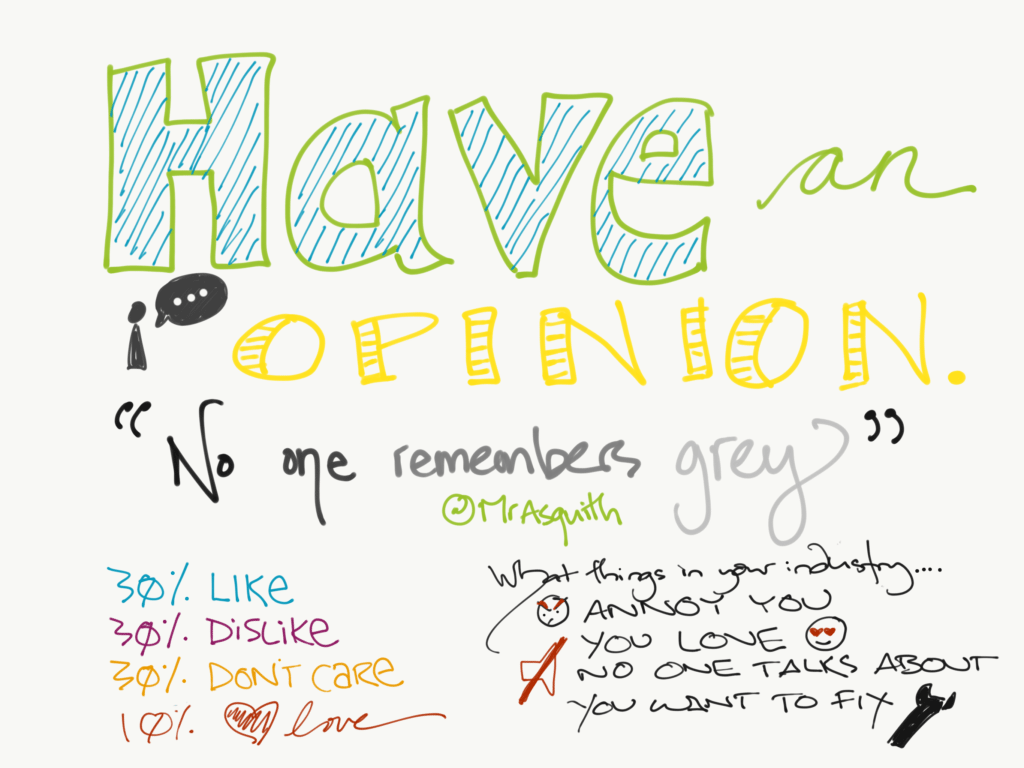
Mark Asquith @MrAsquith
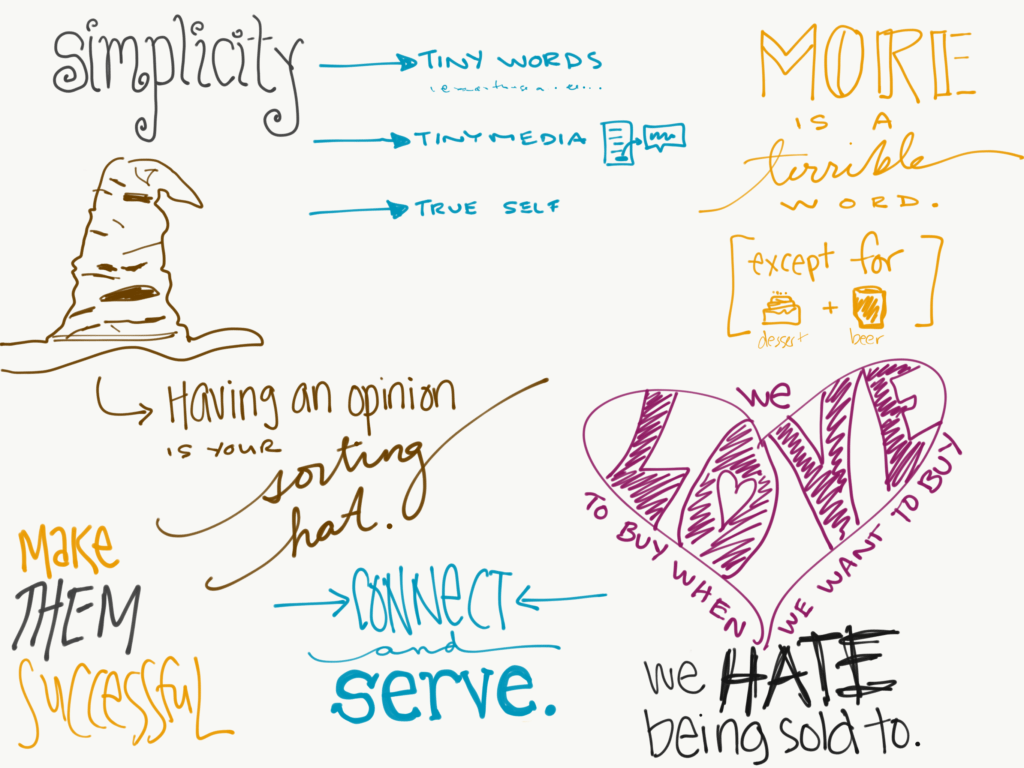
Chris Brogan @chrisbrogan
2. Brag about your clients. (Tell stories.)
“Those who tell stories rule the world.” Plato
Mark Asquith shared this quote, and explained why it’s so important to be human, tell stories, help your clients focus on the life they want to live.
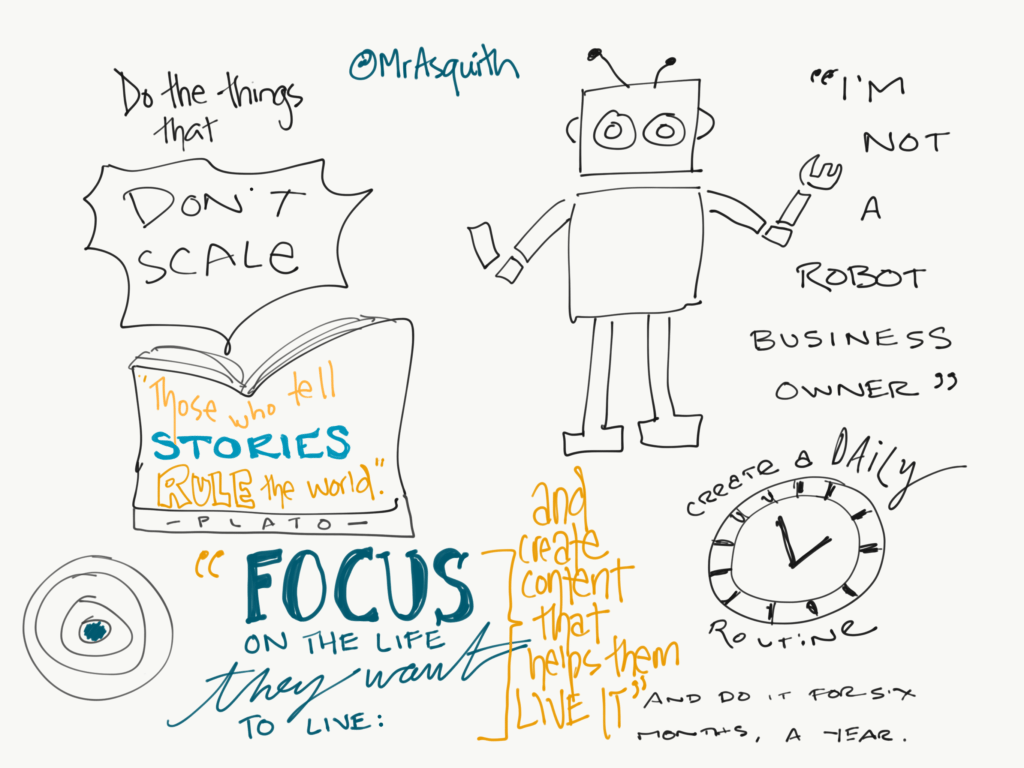
Mark Asquith, @MrAsquith
Mike Morrison, founder of The Membership Guys, shared a similar concept in relation to members of a community – but it relates to clients of accountancy firms as well. “USE your testimonials,” he said. “Don’t just collect them! Screenshot that bad boy!”
I loved his encouragement to “brag about your members” (or in your case, your clients). They’re the hero. They’re the winners. You are the mentor, the one who encourages and supports, but you don’t have to boast when you simply say what you’ve done.
You accountants have INCREDIBLE stories. I mean, really, really amazing.
I was talking to a firm in Canada who are having us write some case studies for them, and one of the team had already interviewed the client, and was now getting a little information from the accountants as to what they did to help.
“We didn’t do much,” they said. “We helped them get a loan.”
We asked them to tell us every detail and here’s what they did:
- Ran a ‘blackboard session’ which detailed “Mission to action”
- Talked about where they wanted to be in five years
- Went through the detail of what it is the company actually did
- Asked what their lifestyle looked like in the future, in numbers
- Worked backwards from the numbers to identify the sales, profits, margins they needed now
- Identified the production capacity they had (very low)
- Assisted with getting a $150k loan for the equipment needed
The result was that the company went from an average of 16-17 hours of production to 7 hours of production – with a much, much higher output as a result. They’ve literally cut their production time IN HALF, with a greater output, and an absolute and instant effect on their profits.
The clients we interviewed for the case study said these things, word for word:
“The sooner you work with the right accountant, the sooner you feel the weight lifted off your shoulders”
“They showed us what accounting could be”
You have to tell these stories.
Don’t sit on them. Don’t simply collect them. Don’t sit around feeling good about yourself. Don’t hide your stories under a bushel.
Screenshot those bad boys. Get them out there.
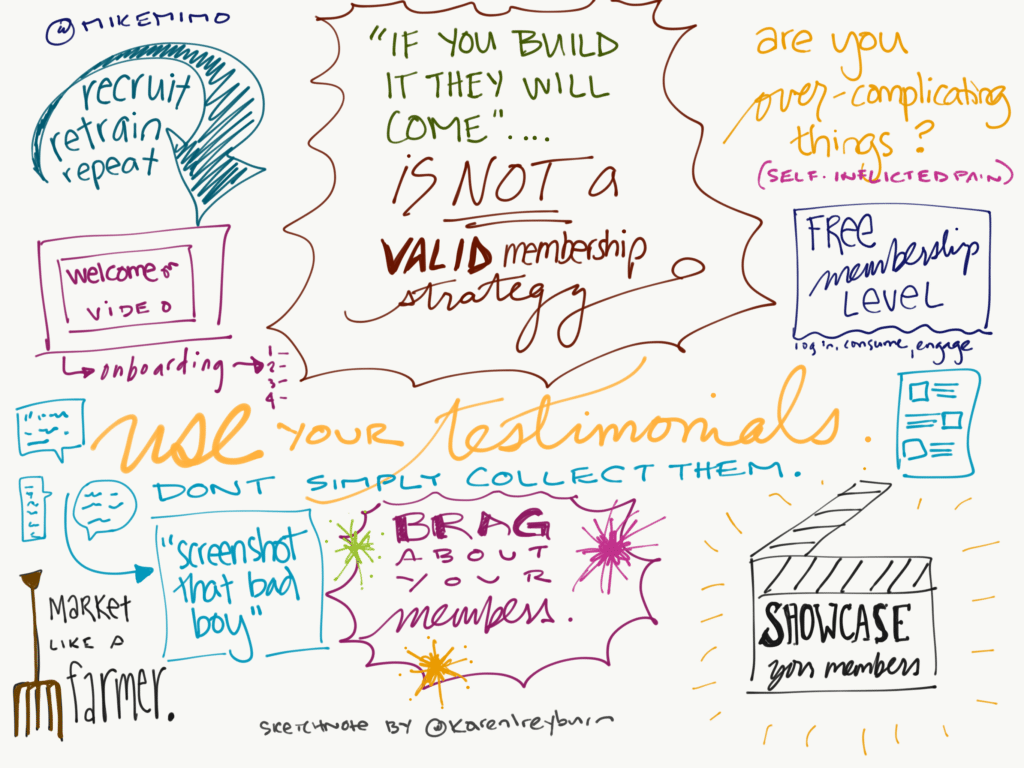
Mike Morrison, @MikeMIMO
3. Build an experience
Brian Fanzo talked about how disruption and change are the new normal, and how millennials would far rather spend money on an experience than a product or a service. You can still sell your product and service of course! But it’s the experience that your buyer wants.
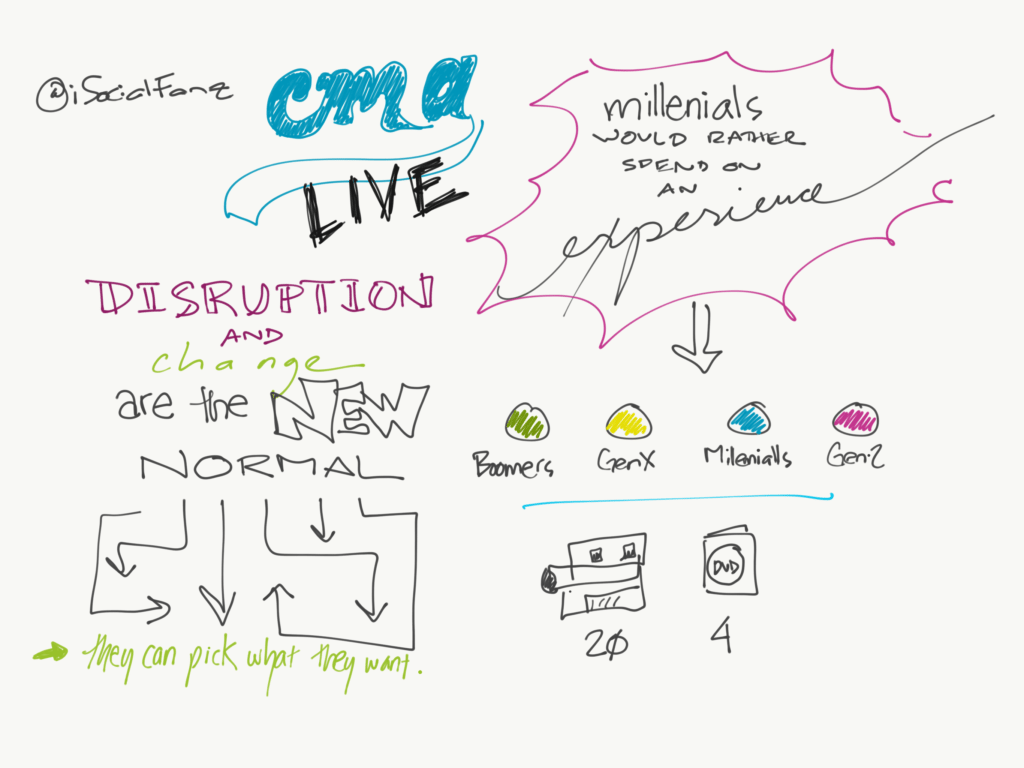
Brian Fanzo, @iSocialFanz
Chris Brogan said this too: your audience is looking not only for a great experience, but they want to share it. You may see the “young people of today” staring at their phones more than you used to (or you may be one of those people, staring at your phone), but the fact is, that’s how this generation works.
They want to share everything. Give them an experience that allows them to do that.
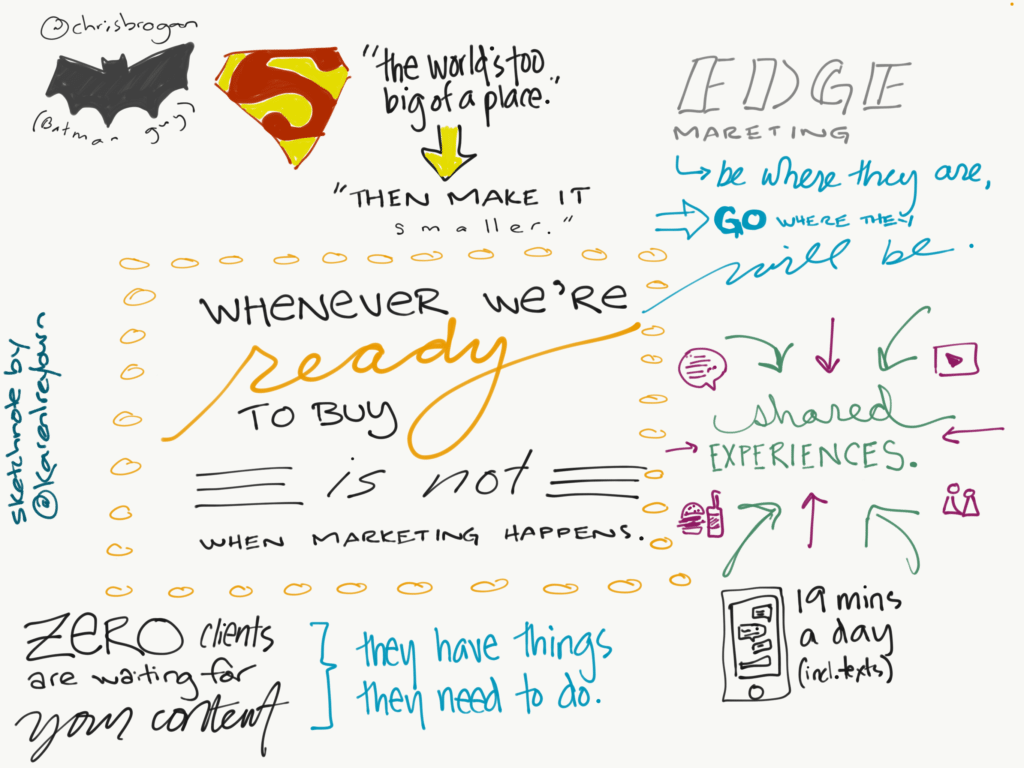
Chris Brogan, @chrisbrogan
Jon Burkhart encouraged the surprise element. Think of a way you can do or share what you’re doing, or who you are, that will grab their attention. Build an experience around story, with a surprise of some kind, and with speed. There’s no time to waste.
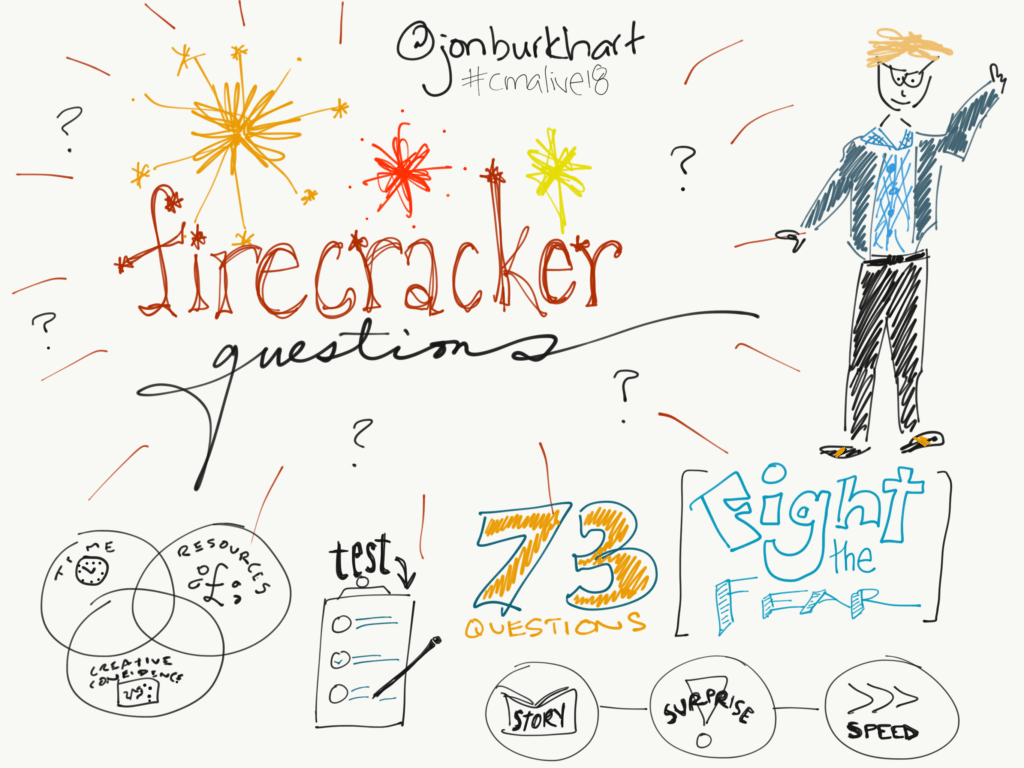
Jon Burkhart, @jonburkhart
4. Show them their doubt is valid
This was a very specific point from Amy Harrison, who is a copywriter. Her talk was so good, with so much in it, that I had to dash off two pages of notes on my ipad to make sure I didn’t miss anything.
She talked about how to write in a way that was appealing to your target audience: and what stood out the most was her statement that when writing copy of any kind, you need to address doubts because they are real.
Show them that the doubt they are feeling is absolutely valid: and then address how you, or your firm, or your services, or your approach is different.
We’ve all seen (and we saw it in Amy’s talk) the companies who say things like “You’re probably wondering why your accountant hasn’t given you cloud accounting software yet”.
Really? Someone is leaning against a kitchen counter, stirring the pasta, saying to a family member, “You know, I really wonder why my accountant hasn’t given me cloud accounting software”.
Of course they aren’t.
What are their actual doubts? What are they really wondering? Even if it is a little scary to put it out there, it’s far more effective than that “professional speak” which applies to nobody.
Amy encouraged us to address these things:
- Why might they not believe what you’re saying is true?
- What have they tried before (that didn’t work)?
- What element of it is that they don’t believe in their own ability to engage with it?
- What or who do they think they need to be, to buy this? (an accountant, a bookkeeper, smart with numbers, whatever)
- Why might it not work in their particular situation?
- What are they actually wondering?
- How would they describe their problem to a friend?
For example, I met someone recently whose accountant messed things up so badly that they owed £30,000 in VAT – and they did not know that bill was coming.
I guarantee you that this person did not say, “I wonder where I could find an accountant who can set up cloud accounting for my business so my VAT returns are completed on time.”
What they said was, “I wonder if I need to take an accounting course so I understand my accounts better” and “I wonder how in the world I’m going to pay this bill on time”.
(I told them that they didn’t need an accounting course – they needed an amazing accountant who would not only help solve their initial cash problem but make sure it never happened again, and would train them to understand their own accounts, not a set of demo accounts.)
Chris Marr suggested that we take a few minutes to write down several reasons why people might not buy from us.
I wrote down a few of why accountants might not work with us at PF, and these are some of the reasons that came to mind.
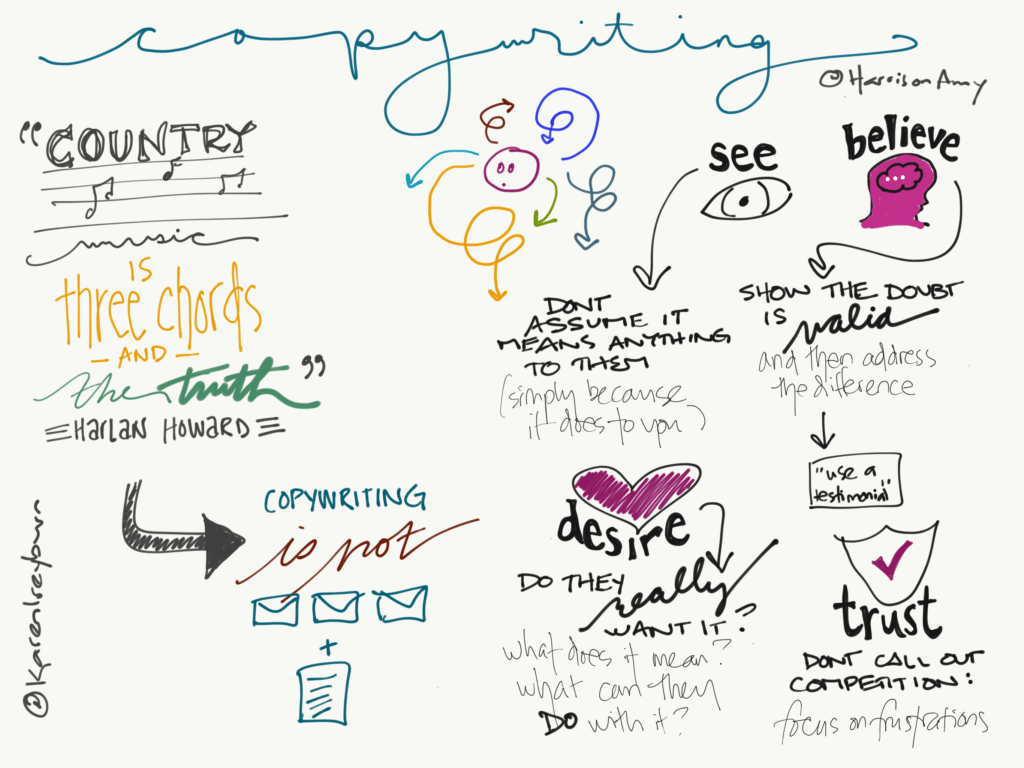
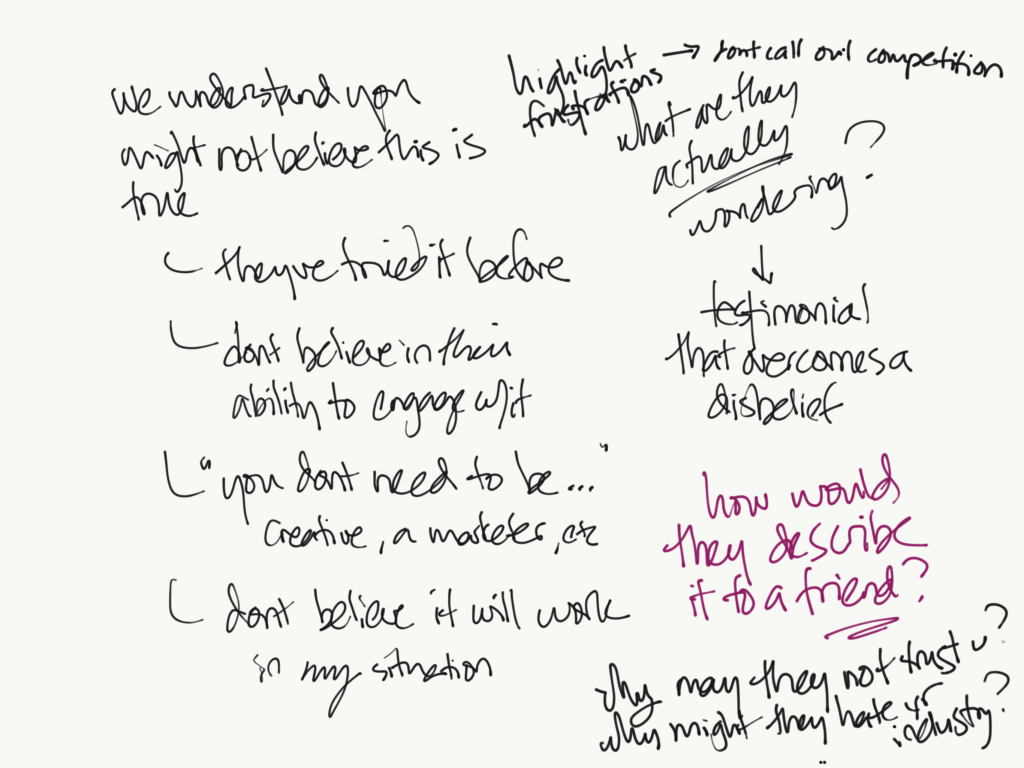
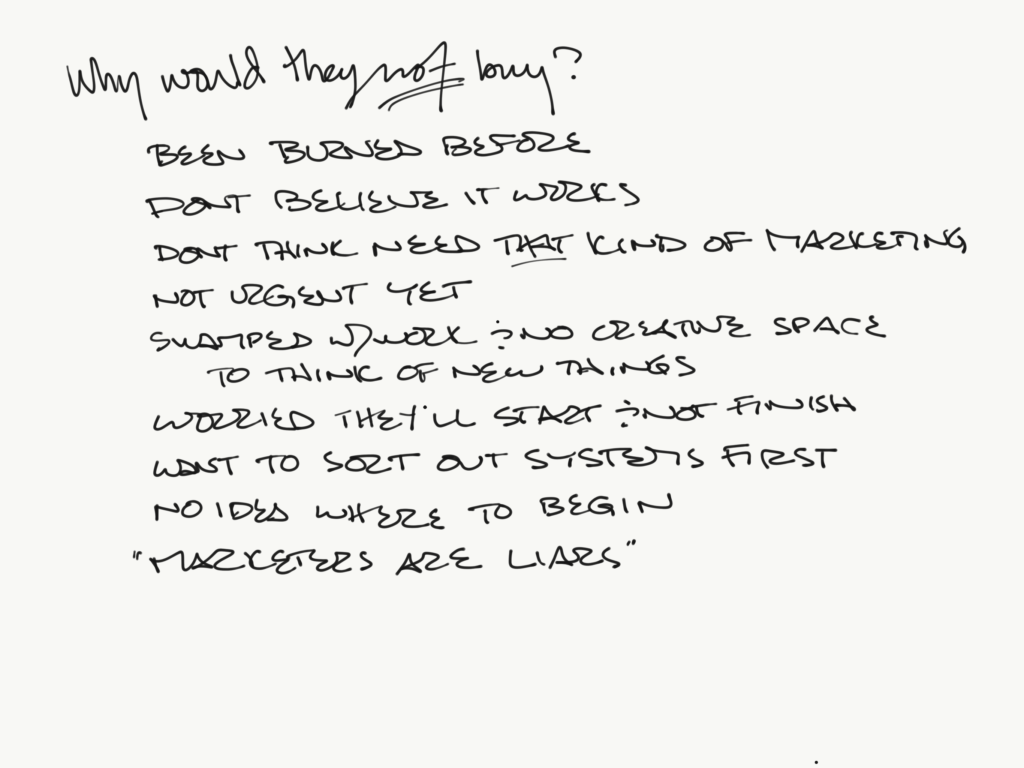
Amy Harrison, @HarrisonAmy
Those are the reasons I’ve got to make sure we talk about in our marketing. What reasons might your prospects have for hesitating in working with you? What can you write or create that will help them to overcome that, in their own time?
5. People come for content & stay for community
This was one of my biggest “aha” moments from the entire conference. “People come for content, and stay for community,” Mike Morrison reminded us.
You can generate all the content you like, but it’s the community that causes people to stay.
In an accounting firm, this ‘community’ is often the feeling of understanding, of belonging that your clients have.
They know they can ring you up anytime. Text you late at night with a quick question. Stop by your offices for a coffee, or whatever. They feel that connection with you personally, and hopefully with your team.
This is one of the greatest things you can invest in. Generate all that great content, absolutely. But remember that content is only the starting point. Community is what makes that content stick.
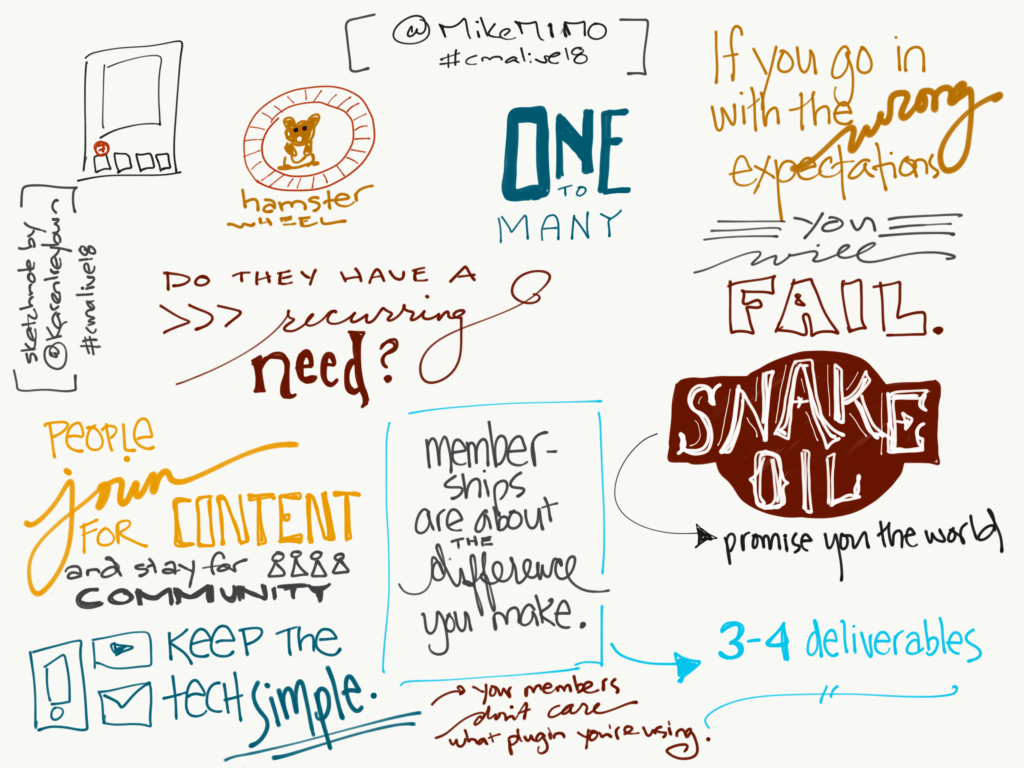
Mike Morrison, @MikeMIMO
“Community is the future of business,” Brian Fanzo said. “And collaboration is the magic.”
There is so much competition amongst accountants these days – but it’s really an illusion. When you build a community that your clients want to be part of (whether that’s through great events or an online group or offices that make them feel welcome), and you collaborate with the right people, who cares about competition? There’s enough business for everyone – and your clients are connecting with you via community.
6. Collaboration is the future of innovation
“Collaboration is the magic.”
Anything that is magic is a win in my book (obviously) – but Fanzo is right. Innovation comes from collaboration – and there are so many opportunities for you as accountants to do that.
Xero or Quickbooks and the associated apps are a perfect example. You as the accountant can build incredible relationships with these apps so you are recommending the right apps to the right clients – and the more you do in collaboration with the apps, the more powerful it is for your clients.
We’re seeing firms revive the “Xero Training Workshop” concept, or the ‘free drop in sessions’, or the ‘app stack’ concept.
You as the accountant are the hub. You’re who your client comes to first, and when you work together with these other companies to understand what is best for each client to use, the relationship is strengthened in a massive way.
It’s also why so many systems have open API’s (or, as I like to put it, “play nicely with other systems”). The more you can connect in a custom way, the better. The old way of a system that does everything doesn’t work anymore.
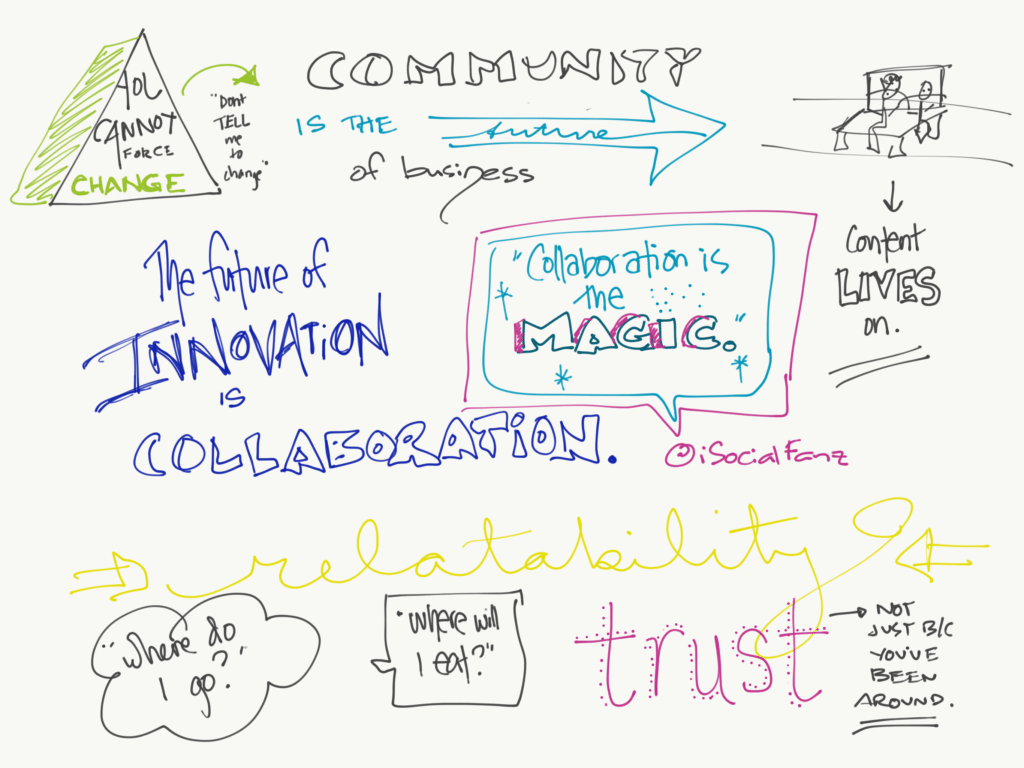
Brian Fanzo, @iSocialFanz
7. Perfection is a fairy tale
“Perfection is a fairy tale,” says Brian Fanzo. “It’s the enemy of done.”
It’s my old standby, “Not perfect but done”, told in a different way. (See also point 8!)
We have to accept that not only do you not have to be perfect….but it will never be perfect.
Even looking at this sketchnote I can see all the awesome ways I could have sketched a fairy tale, princesses, dragons, castles…and I didn’t. There wasn’t enough time because I was taking notes like my life depended on it.
So you can give up the fairy tale of perfection, and get something done.
Brian and a few others talked about how “done” isn’t simply for the sake of being done. The correlation to my not-perfect-but-done phrase is “Not perfect, but good”.
It still has to be something good. Something relevant. Something your clients care about and want to read or watch or connect with.
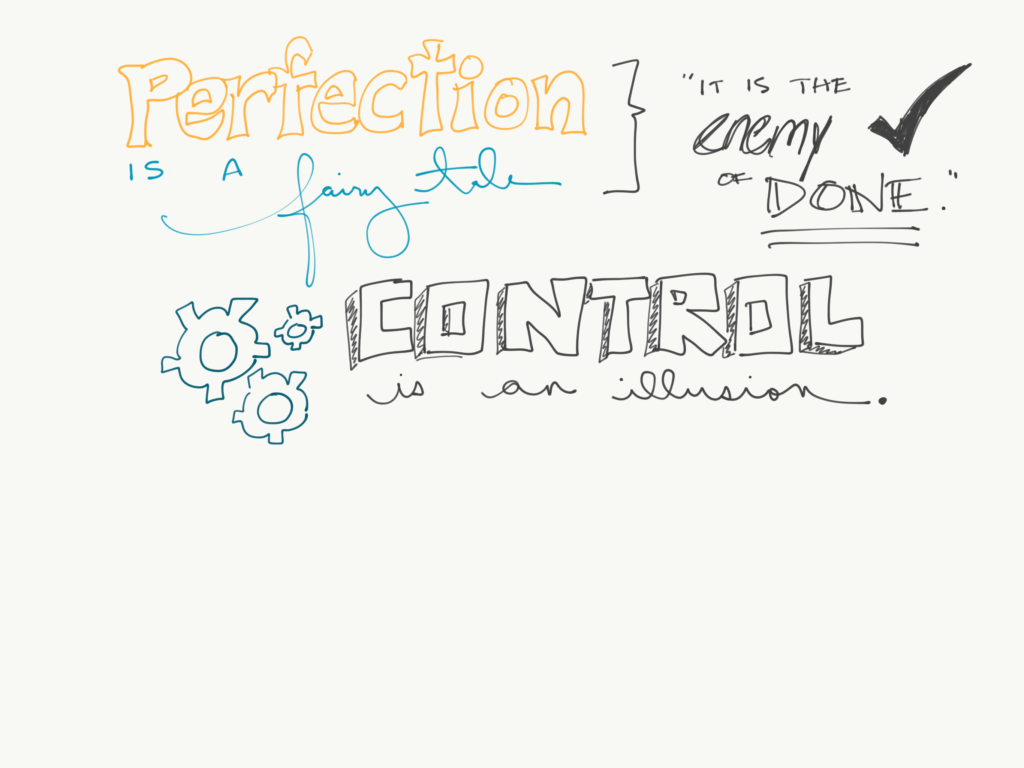
Brian Fanzo, @iSocialFanz
“The world doesn’t need more professionals”, said Mark Asquith. “It needs YOU.
I loved his definition of ‘professional’:
- Showing up
- Doing the work
- Having integrity
- Being nice
That’s it. If you wear a baseball cap, or sunglasses on your head (don’t even get me started on the 60+ comments on a LinkedIn post about how that’s somehow “unprofessional”) – it doesn’t really matter. Show up, do the work with integrity, and be nice. Anything else is your choice. Anything else will help draw the line between people who like you and want to work with you, and those who don’t.
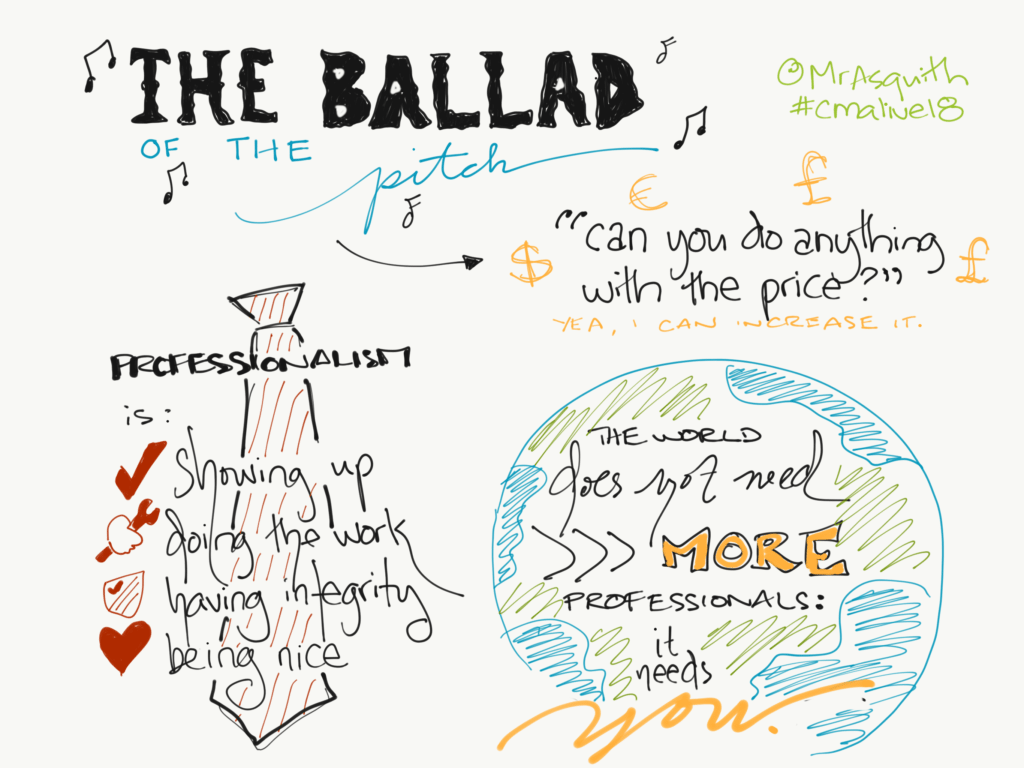
Mark Asquith, @MrAsquith
8. Embrace the messy
It may seem that this is the same as the previous point, but there’s a big difference.
Don’t merely accept that things aren’t going to be perfect: prepare yourself, win yourself over to the mess.
Gavin told an amazing story about one of the first videos he ever recorded. He was literally standing in the woods, amongst a bunch of pine trees, talking about Twitter.
“Why do you think I was in the woods?” he asked us.
“Because of the birds chirping, which is like tweets, which is Twitter,” a few people responded.
“Yea, I wish I had been that clever about it,” Gavin said with a laugh. “The truth is, I was scared. I didn’t want people to see me recording this video so I literally hid in the woods. Unsurprisingly, I didn’t get a lot of views on that video. But it was a start.”
The key is to start with the messy.
I’ll write a whole post on this later, but I spent well over an hour this week trying to figure out Instagram stories. They are confusing. I recorded a live video, screenshotted a video, added pictures to my story, and sent 15 minutes’ worth of direct messages to a friend of mine before I finally worked out how to do it. (And even then it was still a bit messy.)
Gavin also shared that the more videos you share, the more your prospects say “I feel like I already know you” the first time you meet them in person.
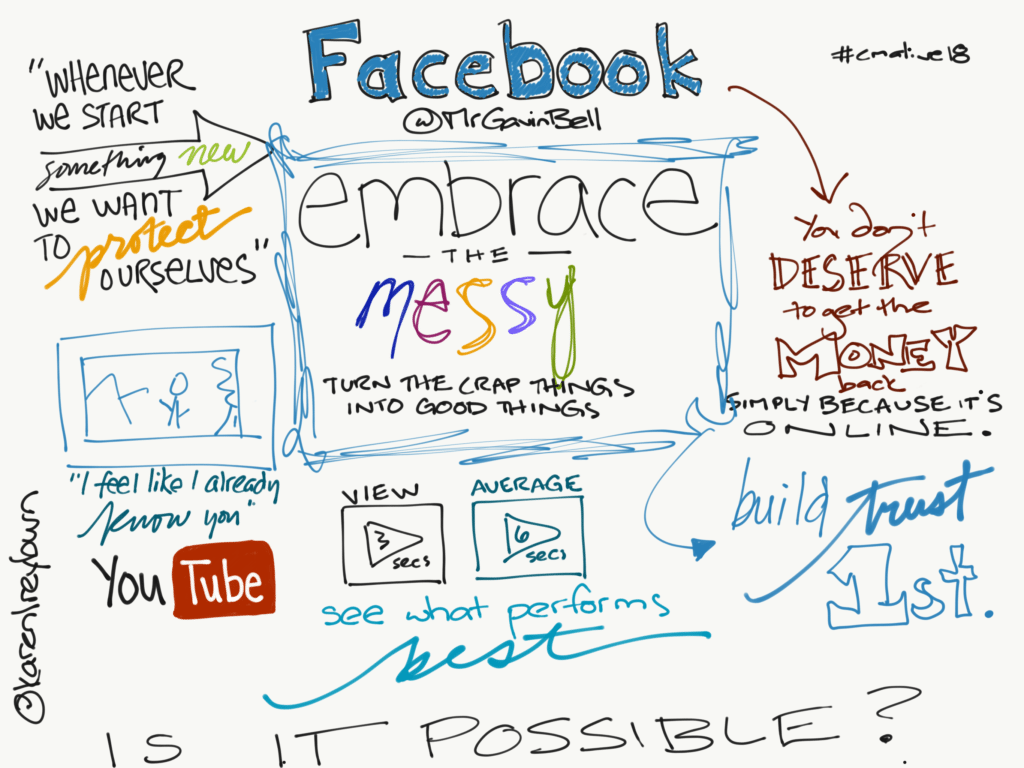
Gavin Bell, @MrGavinBell
Salma Jafri agreed with Gavin about video: “There’s no place to hide with video”, she said.
You can write things in a particular way, edit and fix and adapt and change – but really the reason people love to see you on video is that they get to see you for who you truly are.
That’s who they want to connect with. That’s what builds trust, when the person or people they see in the video is the same as what they experience in person.
Marketing is messy. Embrace it.
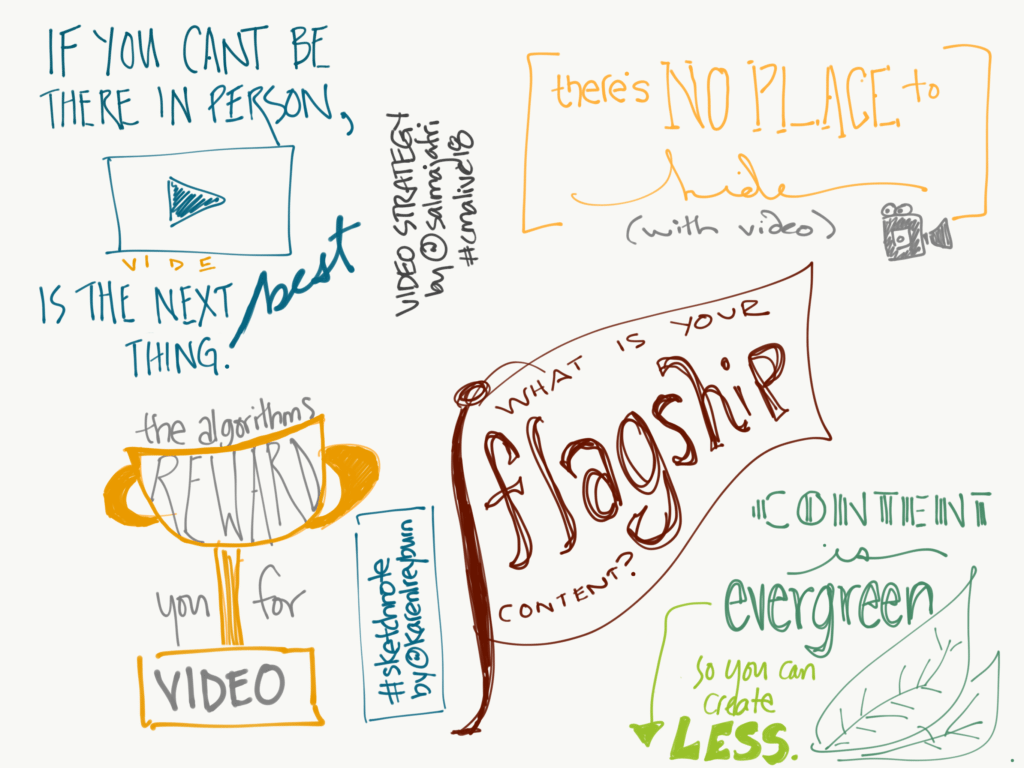
Salma Jafri, @salmajafri
9. Brevity: tiny words, tiny media
Simplicity was another theme. Chris Brogan said “tiny words, tiny media, tiny stories” is what you want to build.
Yes, having a proper case study video professionally produced and presented on your website can be helpful.
But what about a quick screenshot of a comment a client made about how grateful they are for the work you’ve done? (With their permission, of course.) What about dashing off a social post with a quote from an event you attended? Or an 11 second Instagram story (if you can figure it out) to share your travels that day?
The tiny things add up and make an impact over time.
By all means write extensive content, too (obviously this marketing tip is hardly the poster child of brevity), but intersperse it with the tiny stuff. Make use of the thirty seconds, or the five minutes, you have between meetings: because the tiny things matter.

Chris Brogan, @chrisbrogan
Amy Harrison addressed this in relation to copywriting. “Don’t assume it means anything to them, simply because it does to you,” she said. She told a story about an airport that sent her a series of emails offering “Premium Security” for only £1. The email went on and on about Premium Security and how premium it was, and how it was only a pound….but Amy said, “It didn’t tell me anything about what exactly it was and who needed it.”
Turns out that premium security was something to help you skip the security queue if you were flying from a particular airport before the end of the month.
Wouldn’t that have been much more helpful than “Premium security”?
I realised we do that at PF sometimes too. “Join our Accelerator,” we say, and you’re thinking, “what’s an accelerator? Who cares? Why do I need it?”
Brevity means cutting out the terminology and saying what you actually want to say. Make it so a 7 year old can figure it out. Not because your prospective buyer isn’t smart or educated, and doesn’t know how to decipher what you’re saying: but because they don’t have time. They’re going to whizz past it barely reading it. They want brevity because it makes their life easier.
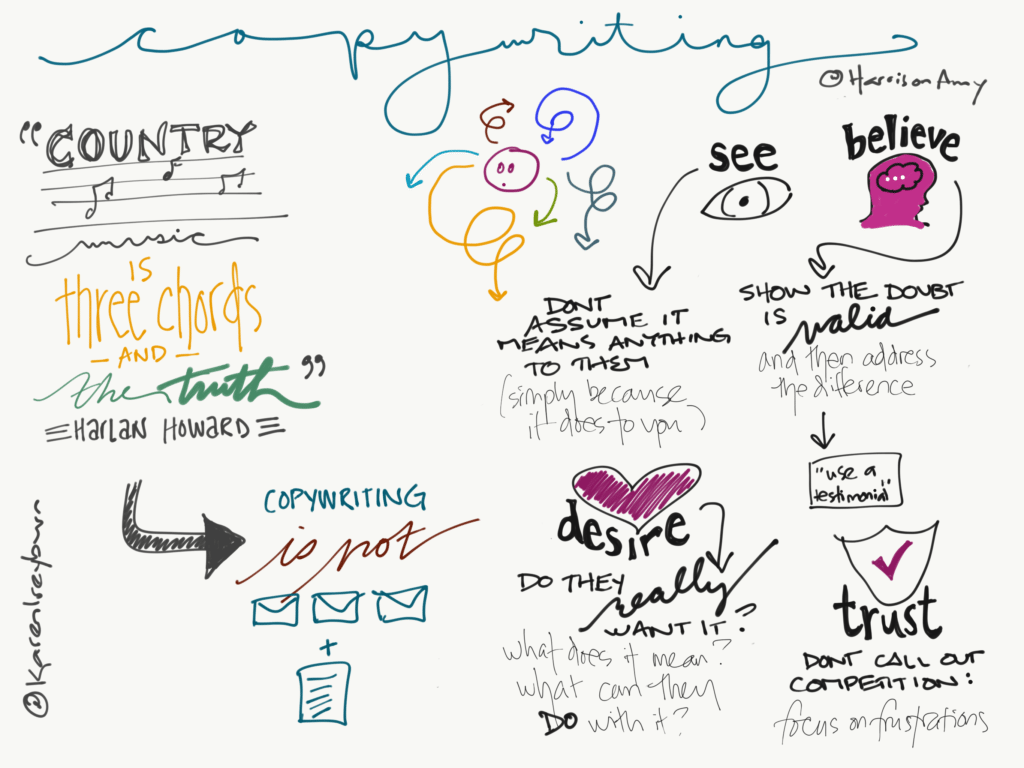
Amy Harrison, @HarrisonAmy
Will you think about coming next year?
It was a top quality event from start to finish, and next year I’m bringing as many of the PF team members as I possibly can.
If you joined our Free Marketing Masterclass, which I ran in conjunction with Chris Marr, you’re already a step ahead. Chris is the guy who runs CMA Live, and he does it brilliantly well. You’ll have one of the best event experiences you’ve ever had. I would definitely put it up there with Xerocon (but on a smaller and more personal scale) for community feel, great fun, and “a conference that doesn’t feel like a conference”.
It’s an experience, is what it is.
I’d encourage you to get on the waiting list now, and consider coming to CMA Live next year. The earlier you book your ticket, the more time you have to get to know everyone who comes next year – and for us at PF it was like a family reunion…centred around marketing.
